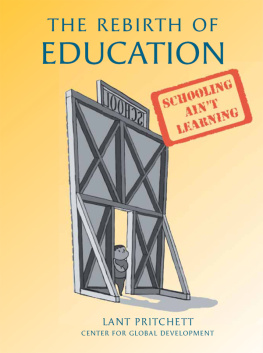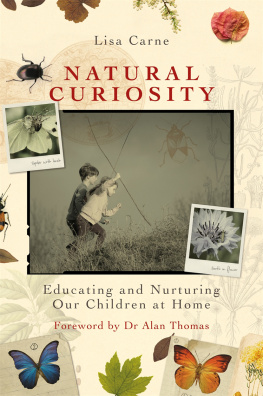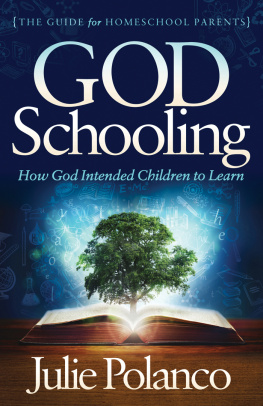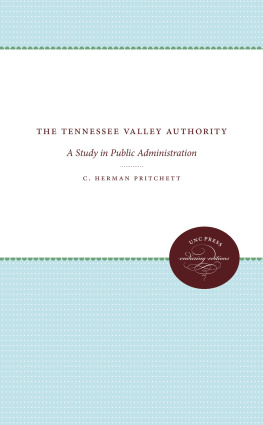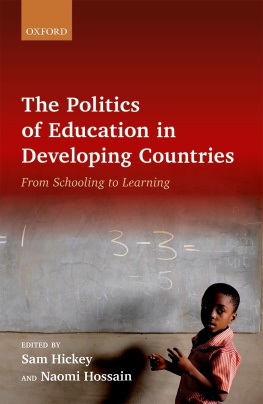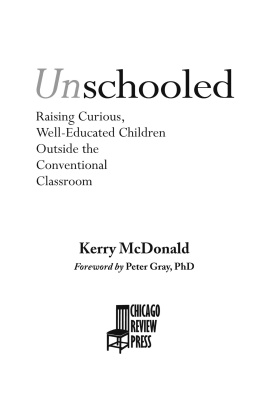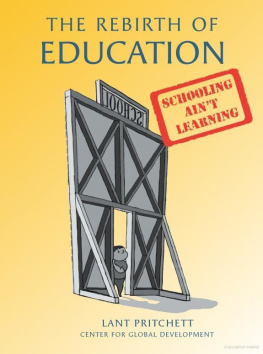Pritchett - The rebirth of education: schooling aint learning
Here you can read online Pritchett - The rebirth of education: schooling aint learning full text of the book (entire story) in english for free. Download pdf and epub, get meaning, cover and reviews about this ebook. City: Developing countries, year: 2013, publisher: Center for Global Development, genre: Children. Description of the work, (preface) as well as reviews are available. Best literature library LitArk.com created for fans of good reading and offers a wide selection of genres:
Romance novel
Science fiction
Adventure
Detective
Science
History
Home and family
Prose
Art
Politics
Computer
Non-fiction
Religion
Business
Children
Humor
Choose a favorite category and find really read worthwhile books. Enjoy immersion in the world of imagination, feel the emotions of the characters or learn something new for yourself, make an fascinating discovery.
The rebirth of education: schooling aint learning: summary, description and annotation
We offer to read an annotation, description, summary or preface (depends on what the author of the book "The rebirth of education: schooling aint learning" wrote himself). If you haven't found the necessary information about the book — write in the comments, we will try to find it.
The rebirth of education: schooling aint learning — read online for free the complete book (whole text) full work
Below is the text of the book, divided by pages. System saving the place of the last page read, allows you to conveniently read the book "The rebirth of education: schooling aint learning" online for free, without having to search again every time where you left off. Put a bookmark, and you can go to the page where you finished reading at any time.
Font size:
Interval:
Bookmark:
I have incurred enormous intellectual and personal debts over the eight years since 2004 that I have worked on the current volume. I give thanks to six groups of people.
First, I have to thank the many coauthors of papers I have written in that time. Deon Filmer is the person with whom I really started writing about education and from whom I have learned the most over the years. In addition I have written papers on education with Amanda Beatty, on overambitious curricula and on learning progress over time; Amer Hasan, on educational goals; Rinku Murgai, on teacher compensation in India; Varad Pande, on local government and schooling in India; and Martina Viarengo, on high performers and superstar economics and on inequality in performance across schools in the public and private sector. In addition, I count as coauthors the team that produced the World Development Report 2004, Making Services Work for the Poor: Junaid Ahmad, Shanta Devarajan, Jeffrey Hammer, Deon Filmer, Ritva Reinikka, Shekhar Shah, Agnes Soucat, Nazmul Chaudhury, and Steven Commins.
Second, many people have directly helped in the production of this book. Duriya Farooqi helped me complete an earlier book. Amanda Beatty read and edited nearly every chapter of the current book. Emily Hurst, my daughter-in-law, provided the illustrations that begin each chapter. Laura Carter worked as a researcher in India and managed the ASER (Annual Status of Education) data. Isaac Pritchett, my son, helped with the references. Bruce Ross-Larson, editor and writing counselor extraordinaire, raised his subtle eyebrows sufficiently to convince me that my almost there manuscript was not so. I thank John Osterman, who handles publications at the Center for Global Development, for steering the book toward production, and the Brookings Institution Press publications staff for their professional support in getting the book into print and out into the world.
Third, this book stands on the shoulders of giants of research into education. Of course, thanking them does not imply that they would agree with me or even that I agree with them, just that reading these writers original research has taught me something: Tahir Andrabi, Paul Atherton, Abhijit Banerjee, Rukmini Banerji, Michael Clemens, Jishnu Das, Sonalde Desai, Esther Duflo, Paul Glewwe, Eric Hanushek, Asim Khwaja, Geeta Kingdon, Michael Kremer, Marlene Lockheed, Karthik Muralidharan, Ritva Reinikka, Justin Sandefeur, V. Sundararaman, and Ludger Woessmann.
This book contains new data. The task of creating new data is thankless so I want to thank those that perform this difficult but essential role. The data produced by Pratham-ASER in India represent a huge leap in scale and conceptualization of assessing performance, and Madhav Chavan, Rukmini Banerji, and Wilima Wadhwa deserve kudos for pioneering this new approach, which has spread. In addition, the company Educational Initiatives and its managing director, Sridhar Rajagopalan, have also pioneered in the development and application of testing learning and capabilities in India.
Fourth, I thank Nancy Birdsall at CGD for her support of this book and of my earlier work. She has been enormously supportive of my work on education and has provided incisive commentary and nudges to finish this book.
Fifth, I thank my own life teachers. Choosing just one at each level of my education I would like to thank Mr. Martin (grade six); Ms. McCabe (grade eight); Gail Young (grade eleven); James MacDonald, at Brigham Young University; Jerry Hausman, at MIT; Larry Summers, postgraduate work; and Keith Warner, my tennis teacher. Perhaps none of them meant to teach me what I learned from them, but the unexpected insight is the beauty of education.
Last, my family. Grandpa Hayward's favorite excuse for getting out and getting away with doing just about anything was that he had to see a man about a horse. My own version of Grandpa's excuse is I am working on my book. Since I worked some at home I am sure if my children were to imitate working on a book, they would stare blankly into space or pace around in pajamas or mutter to themselves yes, that's it at inopportune moments. I have tried, unsuccessfully, to convince them all that taking a break from working on a book is working on a book.
My wife, Diane, has a doctorate in political science, has taught choral music in American and international schools, has been a school administrator, and is a teacher in the truest and noblest sense of the calling. I would not be the same without her and our thirty happy years of marriageand neither would the book.
The Center for Global Development
The Center for Global Development works to reduce global poverty and inequality through rigorous research and active engagement with the policy community to make the world a more prosperous, just, and safe place for us all. The policies and practices of the rich and the powerfulin rich nations, as well as in the emerging powers, international institutions, and global corporationshave significant impacts on the world's poor people. We aim to improve these policies and practices through research and policy engagement to expand opportunities, reduce inequalities, and improve lives everywhere. By pairing research with action, CGD goes beyond contributing to knowledge about development. We conceive of and advocate for practical policy innovations in areas such as trade, aid, health, education, climate change, labor mobility, private investment, access to finance, and global governance to foster shared prosperity in an increasingly interdependent world.
Board of Directors
Edward Scott Chair
Nancy Birdsall President
Timothy D. Adams
Q. Munir Alam
C. Fred Bergsten
Henrietta H. Fore
David Gergen
Thomas R. Gibian
David F. Gordon
C. Boyden Gray
Bradley Horwitz
Enrique V. Iglesias
Kassahun Kebede
Susan B. Levine
David Lindauer (ex officio)
John Lipsky
Mark Malloch-Brown
Edward E. McNally
Robert Mosbacher Jr.
Ngozi Okonjo-Iweala
Dina Habib Powell
Sheryl Sandberg
S. Jacob Scherr
Smita Singh
Lawrence H. Summers
Toni G. Verstandig
Honorary Members
John L. Hennessy
Sir Colin Lucas
Amartya K. Sen
Joseph E. Stiglitz
Advisory Group
David Lindauer Chair
Masood Ahmed
Pranab Bardham
Jere Behrman
David Bloom
John Briscoe
Thomas Carothers
Kemal Dervi
Shanta Devarajan
Esther Duflo
William Easterly
Kristin Forbes
Carol Graham
Simon Johnson
Anne Krueger
Gina Lambright
Nancy Lee
Mark Medish
Edward Miguel
Jonathan Morduch
Deepa Narayan
Jane Nelson
Emily Oster
Rohini Pande
Raymond Robertson
Dani Rodrik
David Rothkopf
Andrew Steer
Rebecca Thornton
Nicolas van de Walle
Eric Werker
John Williamson
Ngaire Woods
Ernesto Zedillo


Everyone has the right to education. Education shall be free, at least in the elementary and fundamental stages. Elementary education shall be compulsory. Technical and professional education shall be made generally available and higher education shall be equally accessible to all on the basis of merit.
Font size:
Interval:
Bookmark:
Similar books «The rebirth of education: schooling aint learning»
Look at similar books to The rebirth of education: schooling aint learning. We have selected literature similar in name and meaning in the hope of providing readers with more options to find new, interesting, not yet read works.
Discussion, reviews of the book The rebirth of education: schooling aint learning and just readers' own opinions. Leave your comments, write what you think about the work, its meaning or the main characters. Specify what exactly you liked and what you didn't like, and why you think so.

